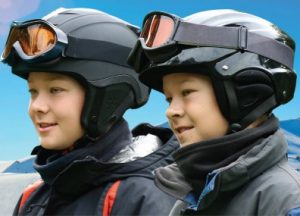 The CSP strongly recommends the use of ski and snowboard helmets by its members and anyone participating in alpine skiing, snowboarding, telemark skiing, and other related snow sliding activities.
The CSP strongly recommends the use of ski and snowboard helmets by its members and anyone participating in alpine skiing, snowboarding, telemark skiing, and other related snow sliding activities.
Look Sharp. Be Smart. Always Wear a Helmet
Use your head. Protect your most valuable asset
Providing services in over 200 resorts across Canada, with approximately 5,000 highly trained volunteers who are on the slopes and trails promoting safety and injury prevention, we encourage new skiers/riders to take lessons, follow the Alpine and Nordic responsibility codes, and wear a helmet.
Helmets are not a substitute for being “aware”. Being safety conscious on the slopes leads to greater enjoyment and better management of the risks that are present here as in all outdoor sports.
The good news is that, according to the Canada Ski Council, there has been an increase in helmet usage on the slopes, particularly by youth. The National Consumer Profile and Satisfaction Survey, conducted annually by the Canadian Ski Council, (CSC) has been tracking helmet usage by skiers and riders for the last four years.
- Overall, helmet usage has increased from 67 percent of all skiers and riders in 2006 to 71 percent in 2010.
- The greatest growth in helmet usage is in the 55 to 64 age group, which has increased to 76 percent in 2010 from 39 percent in 2005.
- Usage is highest in New Brunswick at 95 percent, followed by Newfoundland (75 percent), Alberta (73 percent) and Quebec (77percent).
To read more, click here:
Why Wear a Helmet? Ski Canada – September 2015
Helmets mandatory on Nova Scotia’s ski hills – NS Helmet Act, Dec 16, 2011
“Hats Off” to Canada for increase in “helmets on” – CSC Press Release, January 2012
Links to additional information:
Concussion Management
The Canadian Ski Patrol, in partnership with BrainTrust Canada, has continued its program to inform both patients and patrollers about the serious life impact that a concussion can have.
Thanks to this partnership, thousands of concussion cards and posters have been distributed to CSP patrollers across Canada to be handed on to patients and their families.
Concussion information and management is an important step in managing brain injury. Getting early medical treatment and having a gradual and medically supervised return to activity are important steps in reducing the potential for a concussion to become a cause of death or disability.
Links to additional information:
